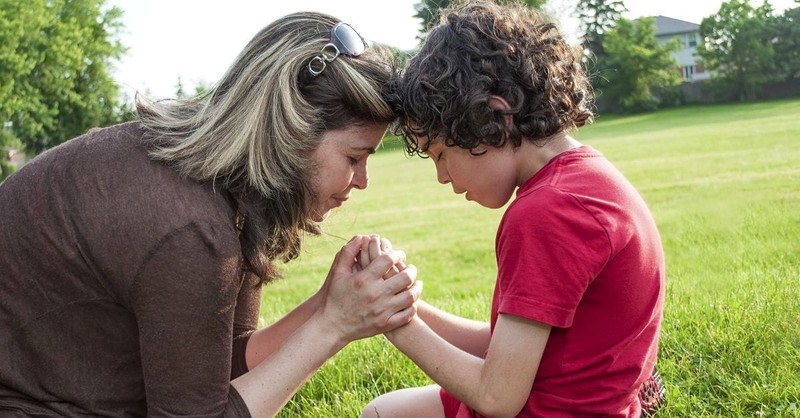
“Madison isn’t my friend anymore,” my daughter told me when I asked her why she wasn’t arranging to have a play date with her best friend from school.
“Why aren’t you friends anymore?”
“I don’t know. All of a sudden, she became weird around me and stopped talking to me. Then when I asked her about it, she said, “I don’t know what you are talking about.”
Being a tween in this day and age can be tough, and parenting them can be tough too, especially when you are raising Christian kids. In situations like the one above, it is hard to watch my child grieve over the loss of a good friend, but the fact that the friend doesn’t share the same values might be a blessing in disguise.
Do you have difficulty figuring out when your child should continue working on a friendship and when to help them let it go? Here are some tips on how to successfully love your kids through difficulties with their friends:
Image Credit: Thinkstock.com

1. Analyze the Word
One attribute that sets spiritually maturing kids apart from other kids is their ability to apply the word of God to their lives. Think about some of the verses in the Bible you think may apply here. For example, the Word tells them to be shining stars amongst a crooked generation (Philippians 2:15) and to be innocent as doves but shrewd as snakes (Matthew 10:16). This applies to making (and keeping) friendships. They are called to be a light and innocent with those they meet, but they must act with wisdom and discernment if the friend is asking them to do something they don’t want to do.
Image Credit: Unsplash.com

2. Listen
As kids learn who their friends are and are not, they are looking for wise counsel more than ever. They need to know a parent is there to listen rather than simply fix a problem. Sit down and let them talk about the situation. In my daughter’s case, she had difficulty telling me or even expressing her feelings about the issue. But once I started asking questions, she began to open up. Perhaps she thought I would say something derogatory about her friend or encourage her to “forget about it” and make a new friend, but I didn’t. I just listened and let her express how she was feeling. So often we just want to move on to the next thing on our busy to-do lists, but when we stop and take a moment to listen, we build trust and show our kids how much we truly care for them. This makes it possible for them to want to seek us out to talk again.
Image Credit: Thinkstock.com

3. Make it right
In some situations, however, your child may have said or done something that hurt their friendship. If what they have said or done was ungodly, they need to know it is not acceptable and that is not how they treat a friend. If they have spread rumors or tarnished someone’s reputation, they need to apologize. Romans 12:18 commands us that, “If it is possible, as far as it depends on you, live at peace with everyone.” Encourage them to sit down with the friend and talk it out. Even if the friendship is over, you have taught them not only effective conflict management but also how to seek peace during conflict.
Image Credit: Thinkstock.com

4. Build their self-esteem
Losing a friend may make them feel like less than or question what is wrong with them to warrant this loss. It is important to reassure your child that, as children of God, are already approved of and loved. They do not have to buy a friend’s attention or affection to be liked. Let them know that if someone doesn’t like them for who they are, then they are not worth being friends with in the first place.
Image Credit: Thinkstock.com

5. Pray
This may be the most important thing we can do in our child’s life. Seeking the Lord in all of the situations will help them build trust with the Lord, too. It will help strengthen the relationship the already have with Him and they will want to seek Him out for comfort and peace in the future too. James 4:2 says, “You desire but do not have, so you kill. You covet but you cannot get what you want, so you quarrel and fight. You do not have because you do not ask God.” In this verse, the people were going outside of God to get what they wanted, rather than waiting on God and trusting him for his provision. How can we expect our kids to have friends that are of good character if we haven’t asked God for them? If we want godly friends for our children, the most important thing we can do is ask God for them. Then we need to trust that He will provide them, even when the timing takes longer than we anticipate.
It is hard to watch a child go through difficult circumstances, especially that of grieving the loss of a friendship. But if we use it is an opportunity to bond and connect with our children, rather than dismiss their feelings, our children may find that their best friend is you.
----
Michelle S. Lazurek is an award-winning author, speaker, pastor's wife and mother. Winner of the Golden Scroll Children's Book of the Year and the Enduring Light Silver Medal, she is a member of the Christian Author's Network and the Advanced Writers and Speakers Association. Her first book with Leafwood Publishers, An Invitation to the Table, came out September 2016. She also teaches at various writers' workshops, such as the Montrose Christian Writers conference. She and her husband live in Coudersport, Pennsylvania, with their two children, Caleb and Leah. For more information, please visit her website at michellelazurek.com.
Image Credit: Thinkstock.com
Originally published Sunday, 06 October 2019.









